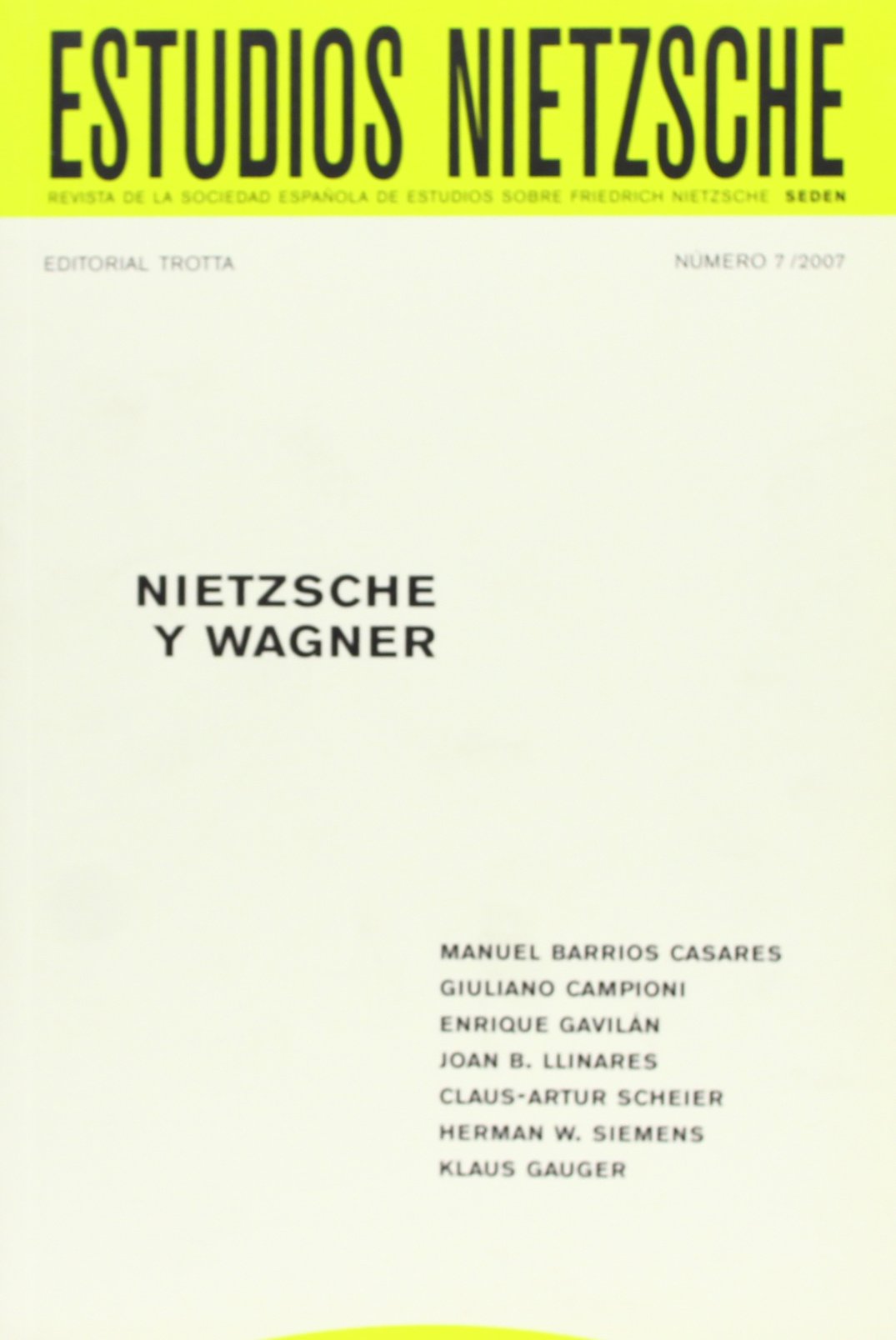Fisiología de la ilusión y la décadence: el problema del actor y del teatro en Nietzsche Y Wagner
DOI:
https://doi.org/10.24310/EstudiosNIETen.vi7.10268Keywords:
actor, theater, decadenceAbstract
The main point of discord in the aesthetics of Nietzsche and Wagner is the comedian’s problem and the role of theatre in society and in the arts. Nietzsche’s entire criticism of the Wagnerian aesthetic ideal can be synthesized in the accusation of «theatrocracy», with all its psychological, sociological and even political implications. But this opposition can be traced further back to Nietzsche’s Schopenhauerian and Wagnerian
period, where, in spite of his admiration of Wagner, Nietzsche conceives of and gives the actor a different role to that given by Wagner, in the arts and, in particular, in music. The later Nietzsche, with his concept of the Dionysian State, simply radicalizes this initial divergence.
Downloads
Metrics
References
Herder,G. Journal meiner Reise mi Jahr 1769 I, en Sämtliche Werke, ed. Suphan, Berlin, 1877-1913, vol. IV, p. 481.
Manno, Francesca, «Fantasmagoria e creazione nell’arte scenica: attore e mimo in Wagner e Nietzsche», en M. Cristina Fornari (ed), La trama del testo. Su alcune letture di Nietzsche, Lecce: Micella, pp. 123-151.
Nietzsche, F., Sämtliche Werke. Kritische Studienausgabe, ed. G. Colli y M.Montinari, VI vol., Berlin-New York / München: W. de Gruytrer, 1980.
Nietzsche, F., Sämtliche Werke. Kritische Studienausgabe, ed. G. Colli y M.Montinari, XIII vol., Berlin-New York / München: W. de Gruytrer, 1980.
Schuré, E., «L’individualisme et l’anarchie en littérature, F. Nietzsche et sa philosophie», en Revue des deux mondes, CXXX (1895), pp. 774-805. Patzer, Andreas, «Erwin Rohde in Bayreuth. Sieben ungedruckte Briefe an die
Braut», Nietzsche Studien, 20 (1991), p. 361.
Wagner, Cosima, Das zweite Leben. Briefe und Aufzeichnungen. 1883-1930, ed. D. Mack, München, 1980.
Wagner, Cosima, Die Tagebücher, ed. M. Gregor-Dellin y D. Mack, 2 vols., München/Zürich: Piper, 1976-1977.
Wagner, R., Das Kunstwerk der Zukunft, DuS, vol. VI, p. 40.
Wagner, R., Eine Mitteilung an meine Freunde, en Dichtungen und Schriften, ed. D. Borchmeyer, 10 vols., Frankfurt a. M.: Insel Verlag, 1983.
Wagner, R. Über Schauspieler und Sänger, DuS, vol. IX.
Wagner, R., Deutsche Kunst und deutsche Politik, DuS, vol. VIII, p. 293.
Wagner, R., Publikum und Popularität, en Gesammelte Schriften und Dichtungen, Lepzig, 1907ss., vol. X.
Wagner, R., Über die Bestimmung der Oper, DuS, vol. IX, p. 169.
Wagner,R. Oper und Drama, DuS, vol. VII,
Wagner,R., Epilogischer Bericht… (1871), DuS, vol.. III, p. 338.
Downloads
Published
How to Cite
Issue
Section
License
As of issue 21 (2021) this journal is published only in open access (diamond route).
From that number 21, like the previous numbers published in NIETZSCHE STUDIES, they are subject to the Creative Commons Acknowledgment-NoComercia-ShareIgual 4.0 license, the full text of which can be consulted at <http://creativecommons.org/licenses/by-nc-sa/4.0 >
It is the responsibility of the authors to obtain the necessary permissions of the images that are subject to copyright.
This work is licensed under a Creative Commons Attribution-NonCommercial-ShareAlike 4.0 International License.
Copyright generates two different rights: moral rights and patrimonial rights that EJFB recognizes and respects. Moral rights are those relating to the recognition of the authorship. They are rights of a personal nature that are perpetual, inalienable, unseizable and imprescriptible as consequence of the indivisible union of the author and his/her work.
Patrimonial rights are those that can be derived from the reproduction, distribution, adaptation or communication of the work, among others.







11.png)
